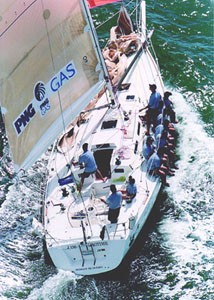Dash for Cash- Cairns to Port Moresby- 455-miles Broad Reaching on the Rhumb-Line
by Don Youldon on 3 Sep 2002

PNG Gas QCYC
Monday 12th May 2003 sees the start of the 455-mile Cairns to Port Moresby Race, the major race in the Coral Sea Classic series. In common with similar events like the 450-mile Cowes to La Rochelle, and the 610-mile Fastnet, the Coral Sea Race is a classic biennial Category 2 event, with prescriptions requiring radio and navigation equipment to Category 1 standard, but there the similarities end.
Those races involve a bash to windward in heavy traffic and cold water, wide open to North Atlantic storms, but the Coral Sea Classic is usually downwind, in light traffic and blue water. It is very much like the old Darwin to Ambon Race, and attracts a similar crowd.
Typically it is a blue water broad reach on the rhumb line, with occasional headers or squalls to keep foredeck hands and trimmers on their toes. For many, it is just a leisurely white-sail cruise, but on the more competitive boats it gets quite physical in the 'right' weather. The hard drivers pump the spinnaker and main at every opportunity to get the boat planing and chase gusts under the clouds, changing up and down between reachers, asymmetric and conventional spinnakers as the breeze swings, or to climb back to the rhumb-line, or to take a detour 'to stick it to the opposition' in the nicest possible way.
After a few hours of this, even the best helmsman loses the plot, so crew rotate from the rail to a winch or sheet, then to the helm and only rarely to a windward bunk. This level of concentration and effort is justified by fierce but friendly competition for glory between line-honours contenders, not to mention the Dash for Cash prizes of about A$10,000 each for the first monohull and multihull boats to break set target times, equivalent to about 12kts and 17kts respectively.
2003 will be the first time an invitation has been extended to water-ballasted or canting-keel yachts, so the monohull race record could tumble in the right weather.
Smaller or slower racing boats are looked after by a Performance Handicapping System (PHS) in both monohull and multihull, and there are Cruise-Rally divisions for yachts wanting a safe, sociable passage, with less emphasis on competition.
A well-equipped Radio Relay Vessel usually escorts the fleet to provide communications and SAR cover and is backed up by the RPYC Race Co-ordination Centre, monitoring radio and satellite communications, liaising with the authorities and media and ensuring boats are properly welcomed on arrival. Armchair sailors can log onto www.sail-world.com/coralseaclassic to track the fleet and get the latest news and gossip about the race.
Race Director Peter Renner is also RPYC Handicapper and uses a fair and fully transparent system in local races. Getting it right for the Coral Sea Series requires a more arcane formula, so Peter gets help from Mark Vickers of Townsville and Murray Langdale of Cairns. 'The offshore races are one-way events, usually off the wind, and the local events are in sheltered or protected waters.
This makes it tricky to ensure a good, fair and balanced contest. All boats should be in with a chance, provided their tactics are good, the boat is pushed to its potential and they have reasonable luck. The thing we can't control is the weather, but all systems have faults unless we all buy Sydney 38's. (The very popular Australian One Design offshore racer).
Measurement systems can produce gross inequities and PHS seems to suit our format. At present we haven't scheduled IMS or IRC classes, but we will review this as expressions of interest come in. Serious racers can rest assured it's a good and fair contest, with the best crews normally getting the best results, but the worse crews probably having more fun. The top boats take it very seriously on the water, but play fairly hard ashore. The handicap committee can't afford to hand lollies to boats that aren't sailed hard, so those who are just looking for some fun in the sun are really better off in the Cruise-Rally fleet.'
For 2003 there are seven sailing events totalling about 750 nautical miles and a full social calendar. There are opportunities for feeder events or cruises in company before and after the series and a composite calendar will be published at a later stage.
The formal Notice of Race for 2003 will be issued shortly. In the interim, the Advance Notice of Race is now available on the Coral Sea Classic site at
www.sail-world.com/coralseaclassic
Detailed information on the race, its history and the organising clubs can be found there.
Skippers of cruising or racing boats who would like to obtain more information, should contact Rob Kothe at mailto:media@tsail-world.com
Owners or skippers of suitable boats for the 2003 series are asked to lodge expressions of interest as soon as possible so they can be included on the mailing list.
The Race Director, Peter Renner can be contacted by email at csc@global.net.pg or the RPYC can be contacted on Fax number +(675) 321 4935. Phone Number + (675) 321 1700
If you want to link to this article then please use this URL: www.sail-world.com/7178